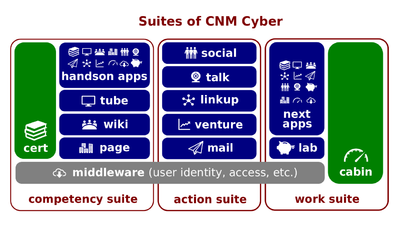Difference between revisions of "Project Parties and Roles"
(→Script) |
(→Script) |
||
| Line 17: | Line 17: | ||
:Another side is [[project management]], which involves actually spending the ''customer's'' money on the product and product delivery that the ''customer'' looks for. | :Another side is [[project management]], which involves actually spending the ''customer's'' money on the product and product delivery that the ''customer'' looks for. | ||
| + | |||
| + | :If the project work is or can be predicted, the [[project manager]] plans the development, discusses the plan with the ''customer's'' representative, and executes the approved plan. | ||
| + | |||
| + | :If the project work cannot be predicted, developers usually work in iterations and constantly discuss the future product and its delivery with the ''customer's'' representative. The project manager's role in that case is senseless. [[Scrum Master]]s or similar ceremonial roles control the development process. | ||
| + | |||
| + | :''Project managers'' control the development of the right product at the right budget and on the right schedule. ''Scrum Masters'' don't deal with work products and deliveries; ''Scrum Masters'' make sure that the development goes according to the agreed rules. | ||
| + | |||
| + | :Building a new house is an example of the project that needs a project manager. | ||
===Key terms=== | ===Key terms=== | ||
Revision as of 03:13, 22 November 2020
What Project Work Is (hereinafter, the Lectio) is the lesson part of Project Work Essentials lesson that introduces its participants to project management concepts. This lesson belongs to the CNMCT Entrance section of the CNM Cyber Placement.
Content
The predecessor lectio is Developments at the Wiki.
Script
- Any development of a unique work product can be defined as a project. An adjective, unique, means one-of-a-kind and indicates something that this developer has never created before. Landing a new job, modification of a business, and re-designing a website could serve as examples of projects.
- Developments of those work products that this developer has already created are called operations. Production of thousands of smartphones of the same model is an operation. Launching a new model of a smartphone is a project.
- In real life, each of us has worked on various projects even without realizing that. Have you ever bought something that lasts for long time? Let say, a bicycle? That was a project. Have you ever sold your old bike? Unless you work as a seller in a used bike store, that was a project as well.
- In the corporate world, projects usually involve several people; some of them last many years. Work on big and costly projects has two sides.
- Enterprise administration is one of them. That mostly involves deciding what needs to be developed and allocating some budget for the project work. The paying customer is the mandatory role on that side. The customer may hire a product owner, project sponsor, or other people whose area of responsibility is making sure that the customer's money are spent on the product that the customer looks for and that is delivered on time.
- Another side is project management, which involves actually spending the customer's money on the product and product delivery that the customer looks for.
- If the project work is or can be predicted, the project manager plans the development, discusses the plan with the customer's representative, and executes the approved plan.
- If the project work cannot be predicted, developers usually work in iterations and constantly discuss the future product and its delivery with the customer's representative. The project manager's role in that case is senseless. Scrum Masters or similar ceremonial roles control the development process.
- Project managers control the development of the right product at the right budget and on the right schedule. Scrum Masters don't deal with work products and deliveries; Scrum Masters make sure that the development goes according to the agreed rules.
- Building a new house is an example of the project that needs a project manager.
Key terms
Closing
The successor lectio is Project Work Constraints.
